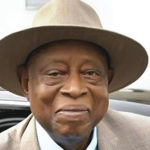The people themselves are severely stressed. The more welfare they expect, the less they get. The more they are told about peace and security, the more they are harassed both by the private armies of the powerful few and hoodlums who are the products of inequities, deprivation, and urban denials. Our law-enforcement agencies are few and ill-equipped.
Does breast sucking lead to sagging?
The society itself has not been trained to ask questions from those who make it by the simple procedure of joining the political class: Understandably, because government is stronger them the people, and is a place where taking what is not yours is an achievement to be celebrated, and for which national honours can be conferred.
The provisions on corruption were prohibitive enough to discourage infringing them before the present anti-corruption and related crimes law was passed. But everyone laughs at the latest political scenes and provisions, as they did the ones preceding them.
We are a federation, and we must operate as a federation. The 36 states are too weak to constitute the federating units. We need another buffer between the states and the federal and that is the present zones that have naturally emerged. They are six, and should constitute the federating units.
The powers at the centre are too many. The power of the National Assembly as the de facto law-maker for everything both on the legislative and concurrent lists is not healthy for the federation.
Government is too involved in businesses, and this promotes corruption. Section 16 of the 1999 Constitution even entrenches the preponderant place of government in running the economy of the nation. There is no doubt that when government is decongested, the economy will automatically be deregulated. Political deregulation must precede economic deregulation.
The people must be brought together as a nation and this can better be done through integrative programmes. We should use what we have to get what we want. The sky is in political deregulation through restructuring, and the acceptance of informal and cost effective governance through active use of the traditional institutions.
The present arrangement is a central government that is headed by an elected President, who has a constitutional responsibility of appointing at least a minister from each state of the federation. At present, there are about 50 ministers. There is also a large army of presidential advisers and assistants who themselves have personal assistants. There are hundreds of parastatals which have hundreds of party men who are board members and constitute a heavy charge on the mean resources of the parastatals.
There is no doubt, therefore, that the present arrangement is not healthy for us. The way out of this problem is restructuring the political arrangement to make it more manageable and less demanding on our resources.
We should retain a three-tier arrangement- The Central government, the Regional government and the State government. The present local government structure should be an affair of the regional government, and be funded by it.
Ademola Orunbon,
Epe.






